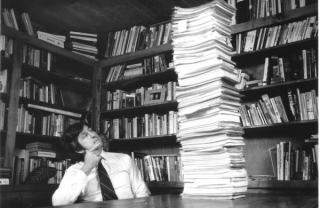Coming of age in the wake of Watergate, in the waning days of the Vietnam War, the student movement of the Sixties made a great impression on me, even if only a bit after the fact. Contrary to conventional wisdom, that
generation of activists was still very much on the scene as I began to become politically active myself in the mid-Seventies. And as I learned about that recent history, it was the founding generation of SDS, Students for a Democratic Society, that I identified with most. Tom Hayden, especially
Our paths crossed twice. The first time was at the University of Illinois in the late 1970s. He was on campus to give a talk, and I found myself in a group of students he spoke with informally in a lounge in the student union afterwards. I don’t remember anything about what he had to say that day. I just remember thinking how cool it was to have the opportunity to meet him, and that, no matter how different our place on the totem pole, we were a part of the same tribe somehow, devoted to fighting the good fight.
The second time was almost forty years later, at a conference in Washington, D.C. last year on “Vietnam: The Power of Protest,” which became a kind of last reunion for many of that generation of peace activists. I saw Hayden give the speech below, and then afterward, as we gathered outside to prepare to march to the King Memorial, he came walking by, stopping for a second to say hello to an old friend who happened to be standing next to me before rushing off to lead the march.
In between those two chance encounters I became an historian, struggling to write a Ph.D. dissertation on the war at home in the United States during World War I, a choice very much influenced by having grown up in a country at war myself, wondering if that war was going to end before I was expected to become a part of it, or if I would have to start fighting the war at home because of my opposition to it.
My work on that dissertation convinced me that such wars are first and foremost discursive struggles, and that the history we write about the past emerges first in the battles to define the meaning of current events in the present. History, then, is never a thing apart from that which it describes. And even after the event is in the past, our understanding of it can become the ground upon which we begin the process of making sense of new events.
When I heard what Hayden had to say at the Vietnam conference, then, it was as if something had come full circle.
[T]he struggle for memory and for history is a living thing. It’s ongoing. It does not end. … Each generation has to wrestle with the history of what came before, and ask: Whose interest does this history serve? …
We gather here to remember the power that we had at one point, the power of the peace movement, and to challenge the Pentagon now on the battlefield of memory. We have to resist their military occupation of our minds and the minds of future generations.
When I was in high school, military recruiters were not exactly welcome in our schools. We understood then that military service was nothing so simple as service “to the country.” Certainly not in a country where there is a war at home being fought over the uses to which our military is being put. And what about the service, the sacrifices, the risks taken by those who oppose war? Antiwar activists have risked their livelihoods, taken beatings, been imprisoned, and even been shot dead in America, while fighting for what they believed in. How is their service any less honorable? If we thank the veterans of one side of the war at home, but not the other, whose interest does that serve?
Today is Veterans Day. Thank you for your service, Tom.
The struggle continues.
Tags: antiwar movement, history, memory, peace movement, Tom Hayden, veterans, Vietnam War


